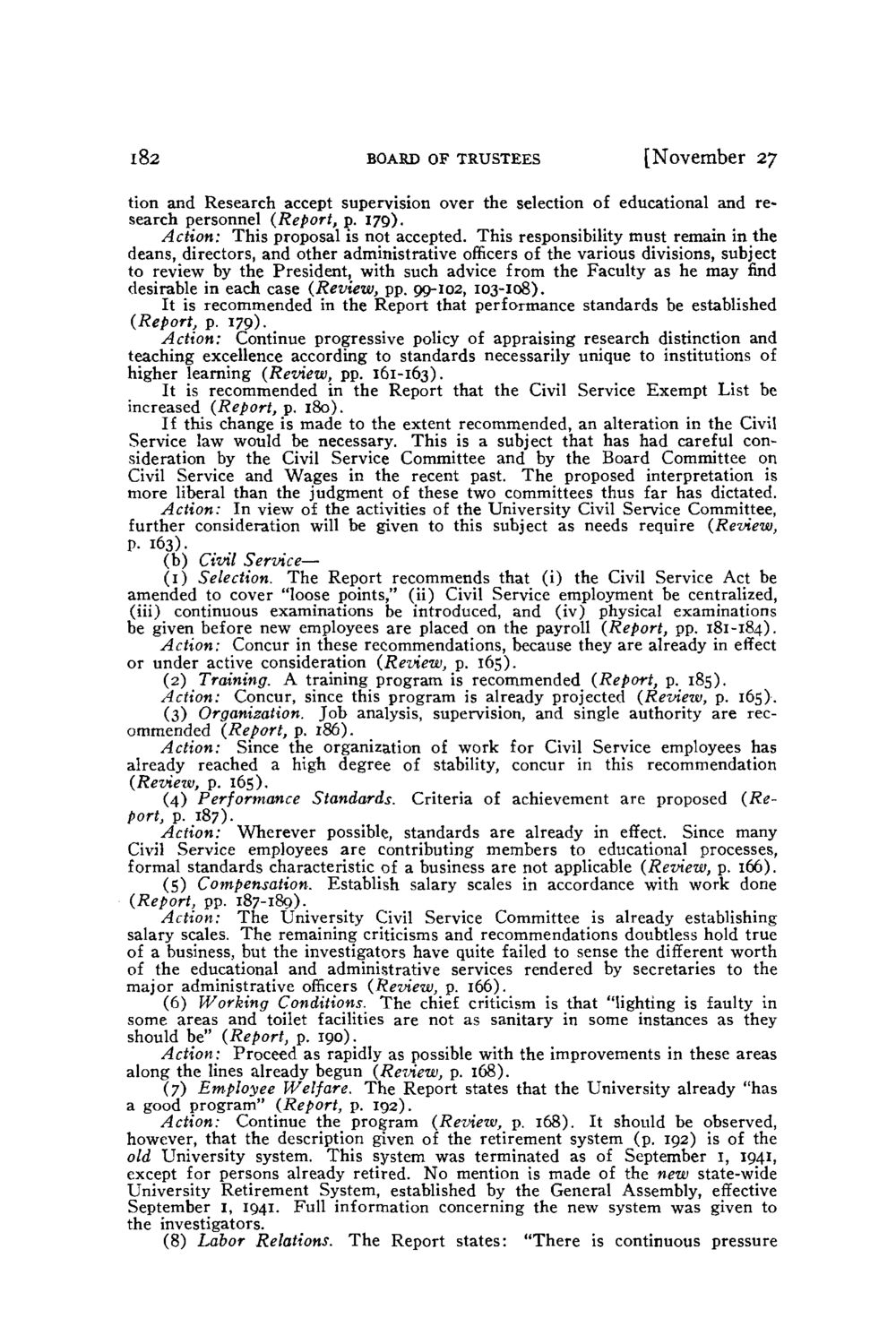| |
| |
Caption: Board of Trustees Minutes - 1944
This is a reduced-resolution page image for fast online browsing.

EXTRACTED TEXT FROM PAGE:
182 BOARD OF TRUSTEES [November 27 tion and Research accept supervision over the selection of educational and research personnel (Report, p. 179). Action: This proposal is not accepted. This responsibility must remain in the deans, directors, and other administrative officers of the various divisions, subject to review by the President, with such advice from the Faculty as he may find desirable in each case (Review, pp. 99-102, 103-108). It is recommended in the Report that performance standards be established (Report, p. 179)Action: Continue progressive policy of appraising research distinction and teaching excellence according to standards necessarily unique to institutions of higher learning (Review, pp. 161-163). It is recommended in the Report that the Civil Service Exempt List be increased (Report, p. 180). If this change is made to the extent recommended, an alteration in the Civil Service law would be necessary. This is a subject that has had careful consideration by the Civil Service Committee and by the Board Committee on Civil Service and W a g e s in the recent past. T h e proposed interpretation is more liberal than the judgment of these two committees thus far has dictated. Action: In view of the activities of the University Civil Service Committee, further consideration will be given to this subject as needs require (Review, p. 163). (b) Civil Sendee— (1) Selection. T h e Report recommends that (i) the Civil Service Act be amended to cover "loose points," (ii) Civil Service employment be centralized, (iii) continuous examinations be introduced, and (iv) physical examinations be given before new employees are placed on the payroll (Report, pp. 181-184). Action: Concur in these recommendations, because they are already in effect or under active consideration (Review, p. 165). (2) Training. A training program is recommended (Report, p. 185). Action: Concur, since this program is already projected (Review, p. 165). (3) Organization. J o b analysis, supervision, and single authority are recommended (Report, p. 186). Action: Since the organization of work for Civil Service employees has already reached a high degree of stability, concur in this recommendation (Review, p. 165). (4) Performance Standards. Criteria of achievement are proposed (Report, p. 187). Action: Wherever possible, standards are already in effect. Since many Civil Service employees a r e contributing members to educational processes, formal standards characteristic of a business are not applicable (Review, p. 166). (5) Compensation. Establish salary scales in accordance with work done (Report, pp. 187-189). Action: T h e University Civil Service Committee is already establishing salary scales. T h e remaining criticisms and recommendations doubtless hold true of a business, but the investigators have quite failed to sense the different worth of the educational and administrative services rendered by secretaries to the major administrative officers (Review, p. 166). (6) Working Conditions. T h e chief criticism is that "lighting is faulty in some areas and toilet facilities are not as sanitary in some instances as they should be" (Report, p. 190). Action: Proceed as rapidly as possible with the improvements in these areas along the lines already begun (Review, p. 168). (7) Employee Welfare. T h e Report states that the University already "has a good program" (Report, p. 192). Action: Continue the program (Review, p. 168). It should be observed, however, that the description given of the retirement system (p. 192) is of the old University system. This system was terminated as of September I, 1941, except for persons already retired. No mention is made of the new state-wide University Retirement System, established by the General Assembly, effective September I, 1941. Full information concerning the new system was given to the investigators. (8) Labor Relations. T h e Report states: "There is continuous pressure
| |